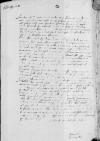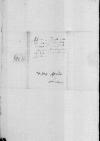 UUB, H. 154, f. 130r
UUB, H. 154, f. 130r
Litterae Reverendissimae Paternitatis mihi tam fuerunt iucundae, ut tota Prussia, region in central Europe, bordered by Pomerania, Poland, Lithuania and Livonia. From 1466 Prussia was divided into Royal Prussia (Prussia Regalis), which was a part of the Kingdom of Poland, and Teutonic Prussia (Prussia Ordinis Theutonici) – covering the remnants of the former territory of the Teutonic Order’s state in Prussia. In 1525, the Order’s last Grand Master, Albrecht von Hohenzollern, converted to Lutheranism and became the first lay duke in former Teutonic Prussia (dux in Prussia), which from then on was called Ducal Prussia (Prussia Ducalis). At that time, as a result of the treaty of Cracow, Ducal Prussia became a fief of the kings of Poland⌊PrussiaPrussia, region in central Europe, bordered by Pomerania, Poland, Lithuania and Livonia. From 1466 Prussia was divided into Royal Prussia (Prussia Regalis), which was a part of the Kingdom of Poland, and Teutonic Prussia (Prussia Ordinis Theutonici) – covering the remnants of the former territory of the Teutonic Order’s state in Prussia. In 1525, the Order’s last Grand Master, Albrecht von Hohenzollern, converted to Lutheranism and became the first lay duke in former Teutonic Prussia (dux in Prussia), which from then on was called Ducal Prussia (Prussia Ducalis). At that time, as a result of the treaty of Cracow, Ducal Prussia became a fief of the kings of Poland⌋ non possit quicquam proferre mihi iucundius. Non potui eas non ostendere Samuel Maciejowski (*1499 – †1550), humanist and diplomat, one of the most trusted advisors to King Sigismund I and then to his son Sigismund II Augustus; from 1521 Canon of the Collegiate Chapter in Sandomierz, and from 1530 in Kielce; from 1531 Canon of Gniezno; from 1532 or 1533 to 1537 royal secretary (previously scribe at the royal chancellery); 1537-1539 Grand Secretary; 1539-1547 Crown Vice-Chancellor; 1539-1541 Bishop of Chełm; 1541-1545 Bishop of Płock; 1545-1550 Bishop of Cracow; 1547-1550 Crown Grand Chancellor; in 1532 royal envoy to Rome; in 1534 and 1538 royal envoy to the local diets (WYCZAŃSKI 1990, p. 257-258; Urzędnicy 10, p. 184; PSB 19 Machowski - Maria Kazimiera, p. 64-69)⌊reverendissimo domino CracoviensiSamuel Maciejowski (*1499 – †1550), humanist and diplomat, one of the most trusted advisors to King Sigismund I and then to his son Sigismund II Augustus; from 1521 Canon of the Collegiate Chapter in Sandomierz, and from 1530 in Kielce; from 1531 Canon of Gniezno; from 1532 or 1533 to 1537 royal secretary (previously scribe at the royal chancellery); 1537-1539 Grand Secretary; 1539-1547 Crown Vice-Chancellor; 1539-1541 Bishop of Chełm; 1541-1545 Bishop of Płock; 1545-1550 Bishop of Cracow; 1547-1550 Crown Grand Chancellor; in 1532 royal envoy to Rome; in 1534 and 1538 royal envoy to the local diets (WYCZAŃSKI 1990, p. 257-258; Urzędnicy 10, p. 184; PSB 19 Machowski - Maria Kazimiera, p. 64-69)⌋ propter plane heroicam generositatem animi Tui, quae in eis tam apparet manifeste, ut in nullo speculo quicquam possit manifestius; oro Deum Optimum Maximum, ut pro eo animi erga me affectum omnia negotia et consilia Tua fortunet.
Heri fui apud Samuel Maciejowski (*1499 – †1550), humanist and diplomat, one of the most trusted advisors to King Sigismund I and then to his son Sigismund II Augustus; from 1521 Canon of the Collegiate Chapter in Sandomierz, and from 1530 in Kielce; from 1531 Canon of Gniezno; from 1532 or 1533 to 1537 royal secretary (previously scribe at the royal chancellery); 1537-1539 Grand Secretary; 1539-1547 Crown Vice-Chancellor; 1539-1541 Bishop of Chełm; 1541-1545 Bishop of Płock; 1545-1550 Bishop of Cracow; 1547-1550 Crown Grand Chancellor; in 1532 royal envoy to Rome; in 1534 and 1538 royal envoy to the local diets (WYCZAŃSKI 1990, p. 257-258; Urzędnicy 10, p. 184; PSB 19 Machowski - Maria Kazimiera, p. 64-69)⌊reverendissimum dominum CracoviensemSamuel Maciejowski (*1499 – †1550), humanist and diplomat, one of the most trusted advisors to King Sigismund I and then to his son Sigismund II Augustus; from 1521 Canon of the Collegiate Chapter in Sandomierz, and from 1530 in Kielce; from 1531 Canon of Gniezno; from 1532 or 1533 to 1537 royal secretary (previously scribe at the royal chancellery); 1537-1539 Grand Secretary; 1539-1547 Crown Vice-Chancellor; 1539-1541 Bishop of Chełm; 1541-1545 Bishop of Płock; 1545-1550 Bishop of Cracow; 1547-1550 Crown Grand Chancellor; in 1532 royal envoy to Rome; in 1534 and 1538 royal envoy to the local diets (WYCZAŃSKI 1990, p. 257-258; Urzędnicy 10, p. 184; PSB 19 Machowski - Maria Kazimiera, p. 64-69)⌋, qui subinde ex me quaerere solet, num adhuc propositum p de profectione Veneta mutaverim, cuperet me valde hic retinere, promittit sacerdotia etiam, verum ego mea commoda inchoatis vixdum studiis Hebraicis anteponere nondum possum, quare heri, cum omnino immutatum me vidit, ultro iussit me de nulla re sollicitum esse, “ego”, inquiens, “equum Tibi procurabo et reliqua, quibus opus erit.” Non puto profecto meliorem et prudentiorem usquam virum vivere. Iam nunc misit ad me unum ex ministris suis, qui me ad crastinum prandium vocavit.
Karl Koczer (Karl Kotzer, Karl Kuczer) (†1538), Cracow merchant, agent of the Habsburgs; Cracow town councillor; 1537 Mayor of Cracow (HDP, p. 736; p. 32; POCIECHA 2, p. 125, 298, 338, 361, 514, 559, 581; POCIECHA 4, p. 44, 53, 74, 337, 402)⌊Carolus KotzerKarl Koczer (Karl Kotzer, Karl Kuczer) (†1538), Cracow merchant, agent of the Habsburgs; Cracow town councillor; 1537 Mayor of Cracow (HDP, p. 736; p. 32; POCIECHA 2, p. 125, 298, 338, 361, 514, 559, 581; POCIECHA 4, p. 44, 53, 74, 337, 402)⌋ se mihi praebet amicissimum propter Dominationem Vestram, ipse me, credo, secum abducturus est Vienna (Wien, Vienna), city in eastern Austria, on the Danube river⌊ViennamVienna (Wien, Vienna), city in eastern Austria, on the Danube river⌋, quamvis dissimulet mercatorum more, qui suas profectiones non multis praedicunt. Velit, quaeso, Dominatio Vestra illi aliquando gratias agere.
Libellos hic a me editos misi per ministrum domini Varmiensis; commentariolum, quamprimum Vienna (Wien, Vienna), city in eastern Austria, on the Danube river⌊ViennamVienna (Wien, Vienna), city in eastern Austria, on the Danube river⌋ venero, augebo et fortasse in reliquas omnes Paul of Tarsus, Saint (*5-10 AD – †64-67 AD), the most important missionary and theologian of early Christianity, known as the Apostle of Nations, author of Letters, the main figure of the Acts of the Apostles⌊divi PauliPaul of Tarsus, Saint (*5-10 AD – †64-67 AD), the most important missionary and theologian of early Christianity, known as the Apostle of Nations, author of Letters, the main figure of the Acts of the Apostles⌋ epistolas paucis scribam.
Quantum ad me attinet, ornatissime Praesul, rectissime, laus superis, valeo et cetera, quam quod reverendissima Dominationis Vestrae praesentia mihi carendum est, per omnia laetus, quocumque devenero, Tui numquam obliviscar. Quicquid Vienna (Wien, Vienna), city in eastern Austria, on the Danube river⌊ViennaeVienna (Wien, Vienna), city in eastern Austria, on the Danube river⌋ in proxime futuris comitiis videro vel audivero, diligenter perscribam. Non potest non esse gratissimum mihi, quod de simulacro meo et ⌊Brixiolo⌋ scribit Reverendissima Vestra Dominatio. Non habeo, quod nunc amplius scribam. Deus Omnipotens conservet Reverendissimam Vestram Paternitatem quam diutissime incolumem cum honesti<ssi>ma cognatione et tota familia.


 UUB, H. 154, f. 130v
UUB, H. 154, f. 130v